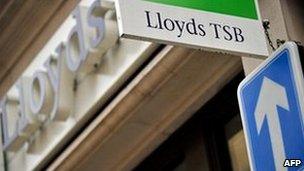Sluggish UK economy means slower Lloyds revival
- Published
- comments

Lloyds has today joined Royal Bank of Scotland in warning that it expects to fail to meet targets for profits growth over the next three years saying that the British economy is not recovering as fast as it had hoped.
To be clear, this downgrading of the UK's growth prospects cannot be laid at the door of the eurozone's crisis - or at least only a part of it can.
It is much more to do with the belated recognition by banks and businesses of how the "deleveraging of the British economy" - the attempt by households, government and businesses to reduce the burden of debt bearing down on them - is squeezing consumption and economic growth.
As I've been banging on about here for years, it is that record aggregate burden of debts accumulated by the British economy - equivalent to around four times the value of everything we produce each year, more than for any major economy other than Japan's - which is the back-achingly heavy weight that means the UK's growth will for many years probably be nearer 1% than the 3% enjoyed for the 16 years to 2008.
What is striking is that businesses appear to be lagging investors in downgrading expectations of growth. After Marks & Spencer and Lloyds this morning delivered relatively downbeat messages about their respective prospects, their share prices rose.
Now, of course, any delay by Royal Bank of Scotland and Lloyds in hitting profit targets carries a number of implications.
These are the two big banks in which taxpayers have huge stakes - so if their profits growth is more sluggish, that will also mean a postponement, probably a lengthy one, to taxpayers getting back all those tens of billions of pounds they've invested in the banks through their privatisation.
There is of course a paradox here. Some will say the banks are partly to blame for the sluggishness of the economic recovery, having pumped up the leverage in the boom years and now - in this era of so-called de-risking and deleveraging - starving businesses with good growth prospects of the credit they so badly need.
That said, the banks are more-or-less hitting the so-called Merlin targets, agreed with the Treasury, for lending to businesses, including small businesses. Lloyds today became the latest bank to say it's on course to meet those targets.
But what has become increasingly clear, in the Treasury and in the Bank of England, is that the Merlin targets are a blunt instrument. They are not stimulating the provision of credit to the businesses perceived to be intrinsically riskier, but whose prospects for long-term returns are also best.
Which is why the chancellor is committed to using taxpayers' money to underwrite the riskier elements of small-business loans, in a new initiative called "credit easing" - whose details are yet to be announced.
Which takes us to another paradox. The Treasury will be nationalising the provision of loans to small businesses through credit easing, because of the perceived failure of the semi-nationalised banks, Royal Bank of Scotland and Lloyds, to direct money where it is most needed.